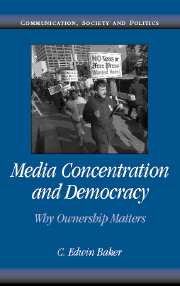Book contents
- Frontmatter
- Contents
- Preface
- Introduction
- 1 Democracy at the Crossroads: Why Ownership Matters
- 2 Not a Real Problem: Many Owners, Many Sources
- 3 Not a Real Problem: The Market or the Internet Will Provide
- 4 The First Amendment Guarantee of a Free Press: An Objection to Regulation?
- 5 Solutions and Responses
- Postscript: Policy Opportunism
- Notes
- Index
- Titles in the series
3 - Not a Real Problem: The Market or the Internet Will Provide
Published online by Cambridge University Press: 05 June 2012
- Frontmatter
- Contents
- Preface
- Introduction
- 1 Democracy at the Crossroads: Why Ownership Matters
- 2 Not a Real Problem: Many Owners, Many Sources
- 3 Not a Real Problem: The Market or the Internet Will Provide
- 4 The First Amendment Guarantee of a Free Press: An Objection to Regulation?
- 5 Solutions and Responses
- Postscript: Policy Opportunism
- Notes
- Index
- Titles in the series
Summary
This chapter addresses two additional arguments – a market thesis and an Internet thesis – offered by those who reject current popular worries about media concentration. Their two arguments are: As long as traditional antitrust laws are enforced, the free market leads even large media entities to provide properly for audiences or, in any event, denies them any real power in the public sphere. Second, the Internet eliminates any reasons to object to media concentration. Each assertion is considered in turn.
THE MARKET CONTROLS AND PROVIDES
Ubiquitous among the many people who have a virtually mystical faith in free markets is the belief that within the market the consumer is sovereign. Firms compete to give the consumer what she wants. Given this belief, it would seem to follow that liberal interventionism must be paternalistic or worse (e.g., rent-seeking). If the market is left unregulated, firms purportedly prosper only by giving consumers what they want – or, more precisely, what they want given their resource constraints and given a particular, contestable, commodified conception of “want.” Firms that fail to do this – for example, because they are not good at it or because they try to do something else – will not succeed in the market. Bankruptcy quickly looms. If descriptively right, this first claim leads to a second: firms themselves have no real power; they must do what the market compels – which, according to the first claim, is to serve the consumer.
- Type
- Chapter
- Information
- Media Concentration and DemocracyWhy Ownership Matters, pp. 88 - 123Publisher: Cambridge University PressPrint publication year: 2006



